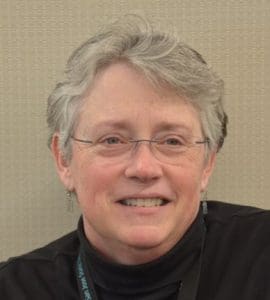 While working on her PhD from 2009 to 2016, Laura Challman Anderson adopted a mantra that has stuck with her ever since: “Keep pushing. Not too hard. Never quit.” A self-proclaimed late bloomer, she earned her doctorate in information ecology from Queensland University of Technology in Australia 36 years after getting her masters in library and information science from Syracuse University.
While working on her PhD from 2009 to 2016, Laura Challman Anderson adopted a mantra that has stuck with her ever since: “Keep pushing. Not too hard. Never quit.” A self-proclaimed late bloomer, she earned her doctorate in information ecology from Queensland University of Technology in Australia 36 years after getting her masters in library and information science from Syracuse University.
“That was a fantastic experience, and I highly recommend mid-to-late career educational experiences,” says Anderson, who credits the mantra with helping her learn the essence of persistence while not burning herself out.
Anderson has persisted in her career as well, spending the past 41 years working at IBM Research – Almaden in San Jose, Calif., where she is a staff research scientist and research lead for external recognition.
In her role, she studies scientific and technical teams, with a focus on collaboration, information sharing, and enabling scientific discovery. She also serves as an educator and advocate for the global IBM Research population to incorporate external society activities, open source software participation, and nominations for external honors into career planning and professional portfolios.
“I have always been interested in the intersection of people, technology and information,” says Anderson. “Even after 40 years, it is a new experience each day. This has given me an appreciation for the transformational positive capabilities that information technologies bring to us, and also a consciousness about the ‘darker side,’ caution about unintended consequences, and awareness about components that don’t work very well.”
When she attended Syracuse University from 1979 to 1980, the IBM personal computer had not been born yet, along with a host of other technologies. But Anderson loved being on the cusp of rapid technology changes.
“I chose the Information Studies (IST) program at Syracuse because it was the most forward-looking program I found at that time,” she says. “I was accepted at a number of other outstanding MLS programs at other institutions, but the Syracuse program was very advanced in its curriculum, and the transformational approaches of the faculty.”
Although she has spent her professional career outside of traditional library and information services settings and hasn’t worked in a library since she received her MLS degree from Syracuse, Anderson says her identity has always been in information science.
“This space is always morphing and changing, and I really like working in such a dynamic and interesting space,” she says. “I am very glad that I chose Syracuse because it positioned me for a non-traditional career while still caring about information and information services. I am very grateful for my experience and carry those lessons and people with me every day.”
